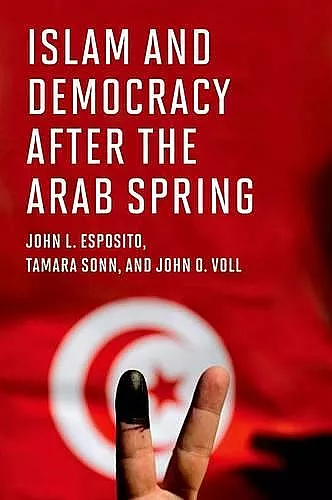Islam and Democracy after the Arab Spring
Tamara Sonn author John L Esposito author John O Voll author
Format:Hardback
Publisher:Oxford University Press Inc
Published:28th Jan '16
Currently unavailable, and unfortunately no date known when it will be back

In late 2010, the wave of civil resistance known as the Arab Spring stunned the world as dictatorships in Tunisia, Egypt, and Libya were overthrown, while the regimes of Bahrain, Syria, and Yemen brutally suppressed their own revolutions. The Islamic political parties of Tunisia and Egypt have gained particular attention for their success in the national elections following the overthrow of their regimes, and similar electoral success has been seen in Morocco and is predicted throughout the Arab world and beyond in the broader Middle East and in Southeast Asia. While the opposition movements of the Arab Spring are distinctive, each has raised questions regarding equality, economic justice, democratic participation, and the relationship between Islam and democracy in their respective countries, such as: does democracy require a secular political regime? And are religious movements the most effective opponents of authoritarian secularist regimes? The argument that that Islamic political groups' participation in democratic processes is only a ruse to actually impose an anti-democratic theocracy once in power continues to be made, often by former political and economic elites and secularists who would prefer a secularist autocracy to a democracy in which religious parties might control the government. In Islam and Democracy after the Arab Spring, renowned Islamic Studies and History scholars John Esposito, Tamara Sonn, and John Voll examine these uprisings and the democratic process in the Muslim world, while also analyzing the larger relationship between religion and politics. Expanding upon issues initially raised by Esposito and Voll in the mid-1990s with Islam and Democracy, Islam and Democracy after the Arab Spring applies a twenty-first century perspective to the question of whether or not Islam is "compatible" with democracy by redirecting the conversation towards a new politic of democracy that transcends both secular authoritarianism and Political Islam.
This valuable book is highly recommended for understanding the contemporary dilemma of Muslin states caught, as they are, between modernity, tradition and certain ideologies. * The Muslim World Book Review Vol.38.2 *
Democracy can take many forms, and the struggle of Muslim majority countries to find a democracy suited to their distinct cultural and political experiences is, as outlined in Islam and Democracy after the Arab Spring, an epoch-making experiment. Countering the 'clash of civilizations' and 'end of history' prophecies, Esposito, Sonn, and Voll show how pre- and post-Arab spring political developments in Muslim majority countries are marathon battles to end authoritarian practices in politics, religion, culture and statecraft. A must-read for those wishing to gain a nuanced understanding of the volatile and complex developments tied to Muslim efforts to make democracy a reality. * Ebrahim Moosa, Professor of Islamic Studies, Keough School of Global Affairs, University of Notre Dame *
This is a very timely book. At a time where many observers are questioning the possibility of a true democratic process within Muslim majority countries, this series of essays shows, from Turkey to Iran, Senegal to Indonesia, that the political experiences are multiple and the way toward democratization is complex, yet open. The authors invite the reader to avoid simplistic conclusions about Islam and democracy. A critical achievement. * Tariq Ramadan, Professor of Contemporary Islamic Studies at the University of Oxford *
For those who see in the apparent failure of the 'Arab spring' proof of the incompatibility of Islam and democratization, Esposito, Sonn, and Voll's new book offers a nuanced and brilliant rejoinder. No work that I know succeeds better at explaining the logic of the political struggles underway in the modern Muslim world. None more fully deserves to be read by scholars and the general reader alike. * Robert W. Hefner, author of Civil Islam: Muslims and Democratization in Indonesia *
ISBN: 9780195147988
Dimensions: 236mm x 160mm x 31mm
Weight: 590g
320 pages